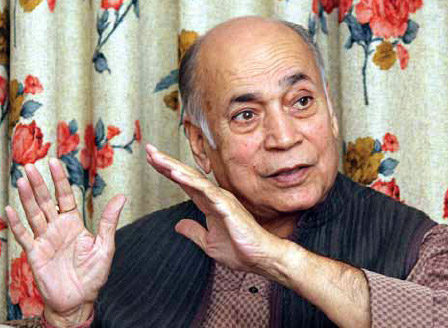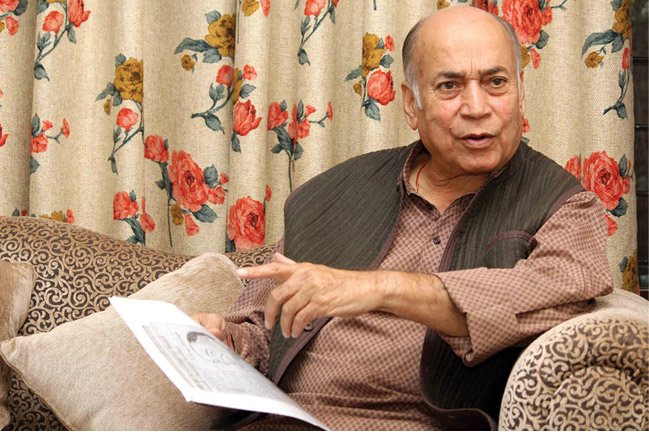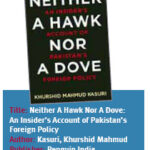MUKUND BIHARI KAUSHAL (73) says he attended three schools in his life—government schools in places like Bareilly, Kanpur, Haridwar and Etawah and schools called ‘family’ and ‘police department’. The first kindled his interest in history and literature and helped him figure among the top 15 in the Union Public Service Commission’s (UPSC) examination for the Indian Police Service (IPS) in 1962.
The second, represented by his grandfather, Raghunath Prasad Kaushal, father, Harish Chand Kaushal and mother, Shyama Kaushal, taught him how to live for others and not to consider anybody inferior (chhota) in life. The trio taught him by example. Raghunath Prasad willed his entire property—land, orchards and house in Kanpur/Fatehpur district of Uttar Pradesh—to a religious charity. Harish Chand, who served as chief engineer in various districts of UP, played benefactor to the children of many of his family members and other acquaintances. Shyama, daughter of a prominent lawyer in Lakhimpur, taught him not to ever look down on children of his family servants who studied with him in government schools. She also taught him to share with others.
As for his third ‘school’, Kaushal says his 37 years in police service and the government taught him to care for his subordinates and people at large, be their leader and fight for their welfare. It taught him to stand by his people and not flinch from owning up to their and his own mistakes.
“My parents were my role models. I learnt from them to be a good human being. I learnt that the criteria of judging your life should be how many people you have been good to. A good human being is the one who lives for others,” says the 1963 AGMUT (Arunachal-Goa-Mizoram and Union Territory)-cadre officer, who served as Delhi Police Commissioner from February 1992 to January 1995. Kaushal joined the IPS on July 10, 1963.
Kaushal spent around three years in the Central Reserve Police Force (CRPF). He was Additional DG CRPF and Chief Coordinator during elections in Jammu & Kashmir—first parliamentary elections and then Assembly polls. In September 1996, he was promoted to the post of DG and led the paramilitary for over a year. He became the first IPS officer to be made Secretary (Internal Security) in the Union Ministry of Home Affairs before retiring on December 31, 2001.
Kaushal, who had a long tenure as police commissioner and was extremely popular among his staff, still draws inspiration from the goodness of his father. He makes it a point to go to Roorkee University (earlier Thomson College of Engineering), from where his father had passed out, every time he visits the city in Uttarakhand. “Memories are always a big support,” he notes.
It all started in the mid-1960s with his first posting as Assistant Superintendent of Police (ASP) in Shahdara (now part of North-East Delhi), when he was asked to evict unauthorised cart vendors from the suburb’s chhota bazaar to unclog a thoroughfare in the market.
“Where will they go? Their vocation is unauthorised, not the men. Police have no business to deprive them of their living. Our job is to maintain peace so that people can exercise their right to earn bread,” was Kaushal’s first ethical dilemma in the police service. He was 24 then. To his satisfaction, a local councillor helped him to resettle the vendors at another place in the area.
A few years later, another incident brought his leadership qualities to the fore. He was the Superintendent of Police (South) in the national capital. There were a large number of colleges in the area and students would frequently vandalise DTC (Delhi Transport Corporation) buses to press for their demands for better transport facilities. On one such occasion, after students of PGDAV College had broken the window panes of DTC buses near the college and the police had used teargas to disperse them, he decided to walk into the college to have a dialogue with the students.
“My Deputy SP, Sardar Amrik Singh, advised me against the move. It was dangerous to go in alone. But I did not see an alternative to talks. I could not have deployed policemen permanently there,” he recollects. Kaushal went in and reasoned with student leaders. Delhi University student union leaders became his ‘dost’ and even organised a farewell for him when he got transfered to Goa in 1973.
In Goa, Kaushal faced another dilemma when the then Chief Minister, Dayanand Balkrishna Bhandokar, ordered him to suspend a head constable, D’Souza (he does not remember his first name). The CM had found during an inspection that D’Souza’s eyes were red and voice muffled, probably due to drinking. Kaushal, then an Inspector General (IG), called D’Souza. The latter was unable to give an explanation. He placed him under suspension.
Subsequently, when Superintendent of Police S Ramakrishna told him that D’Souza did not drink and had lost his voice after the death of his young son, he corrected his mistake. “I immediately called D’Souza and apologised to him in front of other senior officers. I told him I had committed a mistake. Moreover, I decided not to do anything based on hearsay,” he reminisces. The incident made him realise the strength one draws from owning up to a mistake and seeking forgiveness.
KAUSHAL faced an identical situation in Delhi in 1980-81 when he was Additional Commissioner (New Delhi). He overheard people at a party saying how the police had implicated an innocent man in a bride-burning case. “I could not sleep at night,” he recalls. In the morning, he called the DCP and the investigating team to his office and also the accused husband. He got to know that no stove (the allegation was that the bride received burns from a stove) was found at the site and yet the police had charged the man. He apologised to the accused for inconvenience and harassment caused to him and told the investigating officer to withdraw the case.
During his tenure as Delhi Police Commissioner, he always stood by his men and offered to take flak for their mistakes. The police was responsible for the failure of a BJP rally in Delhi in February 1993, in the wake of the demolition of the Babri Masjid in Ayodhya. Thirty-four privilege motions were moved in Parliament against the arrest of over 100 BJP MPs. Kaushal says he told the then MP, Vijaya Raje Scindia, during a hearing that he had clamped Section 144 of the CrPC and was ‘convinced by legality and appropriateness of his orders’. The matter ended after he offered to take responsibility for all omissions and commissions committed by the policemen.

During his three years at the helm as Delhi Police Commissioner, no Delhi Police personnel other than him ever appeared before the Delhi Lieutenant Governor or any other senior bureaucrat or politician. He even refused to transfer Vedpal Rathi, then the SHO of the Jama Masjid police station, at the instance of the Shahi Imam. The matter went up to the Prime Minister. He says that he had told his SHOs that they were the CPs of their area. He got 1,700 of Delhi Police personnel promoted to Inspector and ACP ranks in one go. Besides, in 1993, he started the precedence of inviting the Prime Minister, President and other dignitaries on Delhi Police Day (February 16).
Kaushal persuaded the IPS association to fight for all uniformed men (not IPS alone) and was instrumental in getting Delhi Police constable payscale for the CRPF and other paramilitary forces.
The biggest test of his character, though, happened in 1978 when Prime Minister Morarji Desai led a Janata Party government in Delhi. Kaushal was then the Deputy Commissioner of Police (Security). He was told by his men deployed at the PMO (then 1 Safdarjung Road) that Kanti Desai, son of Morarji, had told them not to frisk his friends at night. This was a grave risk as Kanti lived in a room next to the Prime Minister’s. Kaushal conveyed his concern to the Delhi Police Commissioner orally. After nothing came of it, he wrote a letter to the Commissioner and the head of the Intelligence Bureau.
WHEN the letter was placed before the PM (all IB reports are placed before him) next morning, he noted, “Rules may be observed”. For Kaushal, it was a shot in the arm. The “dignity and grace of Prime Minister Morarji Desai” came as a pleasant surprise to him. Desai even left a recommendation for Kaushal before he quit as the Prime Minister.
He was appointed as a negotiator with JK militants (Hizbul Mujahideen), Naga Undergrounds for ceasefire ground rules and Gorkhaland leader Ghising. Kaushal retired in 2001 as the Secretary (Security) in the Home Ministry when LK Advani was at the helm of affairs in North Block. He worked with the Congress, Janata Party, United Front and BJP-led governments and yet was never identified with a political group.
His “apolitical” nature, “pride in being a policeman” and humane approach to problems during the service are what makes Kaushal a “contented” man.
Kaushal treats his wife, Asha, children (a son and a daughter) and grandchildren as his blessings.
As told to Narendra Kaushik

























































